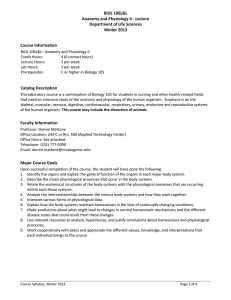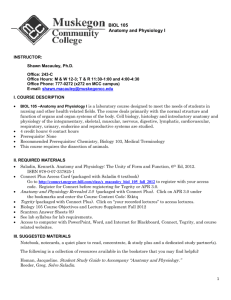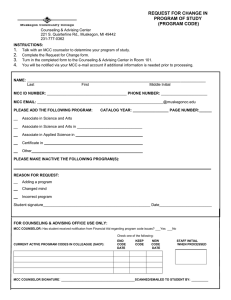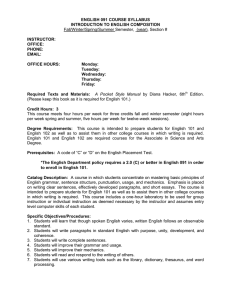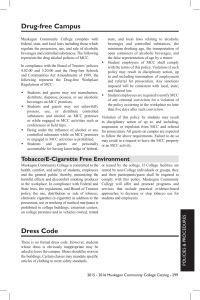Lab Syllabus Fall 2012 Dr. Shawn Macauley
advertisement
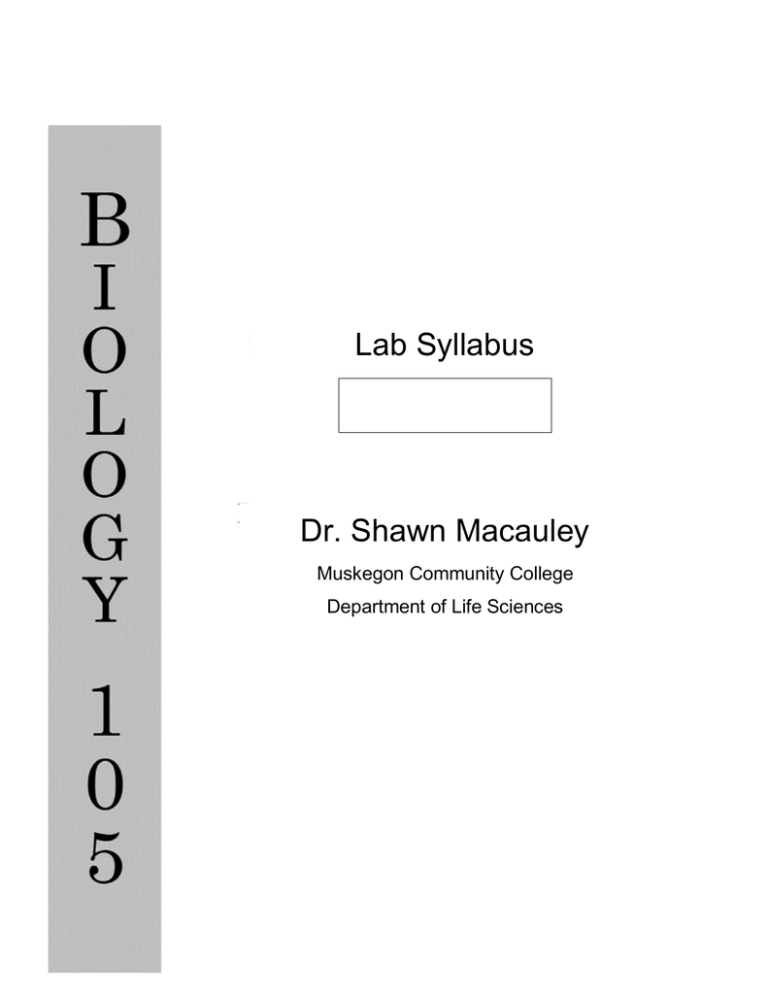
Lab Syllabus Fall 2012 Dr. Shawn Macauley Muskegon Community College Department of Life Sciences Course Information Course Description: This laboratory course is designed to meet the needs of students in nursing and other health-related fields. The course deals primarily with the normal structure and function of organs and organ systems of the body. Cell biology, histology and introductory anatomy and physiology of the skeletal, muscular, nervous, digestive, cardiovascular, respiratory, urinary, endocrine and reproductive systems are studied. 4 Cr. hours; 6 contact hours Prerequisite: None; Co-requisite: BIOL 105 Lecture Recommended: Chemistry, Biology 103. Medical Terminology This course requires the dissection of animals. Room 253: Labs meet throughout the week per the posted schedule. Contact Information: Dr. Shawn Macauley Office Room 243C Telephone: 231-777-0272 (x272 on campus) Email: shawn.macauley@muskegoncc.edu You MUST have written permission from me to attend another lab section. You may only exercise this option twice during the semester. Required Materials: Saladin, Kenneth. Anatomy and Physiology: The Unity of Form and Function, 6th Ed. ISBN: 97-0-07-337825-1 BIOL 105 Lab Supplement Fall 2012 (available in the MCC bookstore) Amerman, Erin C., Exploring Anatomy and Physiology in the Laboratory. ISBN:089582-797-2 Anatomy and Physiology Revealed 3.0 (Access code purchased with Connect Plus) Smith, David G. & Schenk, Michael, P. A Dissection Guide and Atlas to the Fetal Pig 3rd Edition ISBN: 089582-879-0 A set of colored pencils (with blue and red minimum) and a set of 3-4 thin dry erase markers (with red and blue) Laboratory non-latex gloves (you can purchase a box at Meijer or Walgreens or purchase 4 pair in the bookstore) 2 acetate pages (packaged with the lab supplement) Eye protection during dissections. Close-toed shoes must be worn for the labs involving dissections. Evaluation The lab portion of this course will count as 30% of your overall grade for Biology 105 (with lecture counting as the other 70%). Lab grades will be based on the following assessments: 2 lab exams @ 100 pts = 200 pts 11 pre-lab exercises @ 5pts each (lowest score dropped) = 50 pts 11 lab quizzes @ 5pts each (lowest score dropped) = 50 pts Statement on Student Assessment and Accreditation: Muskegon Community College is fully accredited by the Higher Learning Commission located in Chicago (http:ncahlc.org/). The Higher Learning Commission accredits degree granting postsecondary educational institutions in the North Central Region. Accreditation helps ensure students that they are receiving a quality education and can transfer to other colleges and universities with ease and confidence. MCC is committed to an essential part of the accreditation process: assessing student learning. You will likely be asked to participate in assessment activities as part of MCC’s assessment of programs and general education. Statement on MCC Email: All email communication originating from MCC to students will be via their email account. CHECK YOUR MCC EMAIL FREQUENTLY. It is possible to forward your MCC email account to an account you use more frequently. Statement on Student Behavior: Muskegon Community College is a community of scholars whose members include administrators, faculty, staff, and students. Mutual respect and civility are expected in the classroom or other college academic settings, as well as, in any communication. MCC has the duty of providing students with privileges, opportunities, and protections that best promote learning; Students have the right to a non-threatening learning environment; Students have the responsibility to refrain from infringing on the right of others to learn or the right of teachers to teach; and Any student whose behavior disrupts learning may be subject to disciplinary action as outlined in the Muskegon Community College Student Handbook/Planner. Academic Integrity Policy: Muskegon Community College expects that all faculty and students will adhere to high standards of personal and academic honesty. This means that all academic work will be done by the student to whom it is assigned without unauthorized aid of any kind. Faculty members, for their part, will exercise care in the planning and supervision of academic work so that honest effort will be positively encouraged. Academic dishonesty consists of, but is not limited to: A. Cheating. Cheating is defined as using or attempting to use, giving or attempting to give, and obtaining or attempting to obtain, materials or information, including computer material pertaining to a quiz, examination, or other work that a student is expected to do alone. B. Plagiarism. Plagiarism is defined as the use of another’s words or ideas without acknowledgement. C. Penalties for violation of these standards of conduct may result in sanctions of up to and including suspension or expulsion from MCC. Dishonesty of any kind will NOT be tolerated in this course. It is expected that all students adhere to college policy in this manner. Any violation will result in a zero (0) for that assessment and the student will be subject to the measures described in the student handbook. Statement on Dispute Resolution Process: Should a student not agree with a faculty member’s decision or actions as they may relate to this policy, the following steps shall be followed: 1. A student suspected of academic dishonesty shall be notified in writing within two school days of the time the violation is discovered. Copies of the written notification shall also be filed with the department chair and Vice President of Student Services. 2. The student should try to reach resolution of the matter through direct discussion with the involved faculty member within three (3) school days of the written notification. 3. If the matter is not resolved in Step 2, the student shall bring the matter to the attention of the department chairperson of the involved faculty member. 4. If the matter is not resolved at the department chairperson level, the student shall bring the matter to the attention of the Vice President for Academic Affairs who shall render a decision within five school days of the receipt of the dispute information. 3 5. If a satisfactory solution is not reached at the Step 4 level, the student may file a written request with the Vice President of Student Services for a hearing before the disciplinary board. This meeting shall be held not more than 20 days following the written request. A student may request a hearing before the disciplinary board. The disciplinary and judicial procedures are outlined in the Muskegon Community College Student Handbook/Planner. Notes About Lab Attendance is required at all lab sessions. Missing 2 labs (for any reason) will result in an automatic drop per departmental policies. Coming to lab without the required materials can result in your being dismissed from the lab and/or points being deducted from your lab quiz. Lab quizzes and exams cannot be made up and will be scored as zeros (0). Arriving late to lab may result in your not being able to take the lab quiz. Leaving lab early will count as a missed lab. Lab quiz and pre-lab grades will be zeroed out. Points will be deducted for misspelling words on practical exams. Words with one extra, missing or misplaced letter will be awarded ½ credit. Words with two or more errors will receive no credit. Cell phones should be turned OFF during lecture and stored in your backpack or purse. Having cell phones visible during lab is absolutely unacceptable. All student work will be returned to students in a timely manner. Exams and quizzes will be available for review for 2 weeks following each assessment after which they will be shredded. STUDENT CONTACT INFORMATION – OBTAIN THE FOLLOWING INFORMATION FROM STUDENTS IN YOUR CLASS. PLEASE INTRODUCE YOURSELF TO THREE OTHER STUDENTS. Student Name Telephone Email The Dept. of Life Sciences reserves the right to alter this syllabus. While the content in each lab could vary to meet class needs, the exam dates will not change 4

